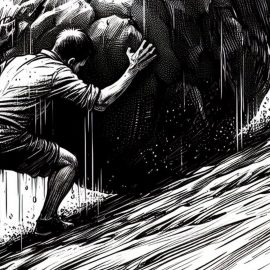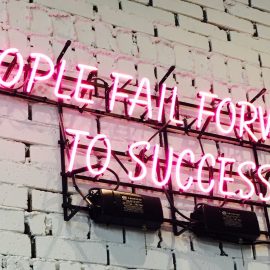

This article is an excerpt from the Shortform book guide to "Keep Going" by Austin Kleon. Shortform has the world's best summaries and analyses of books you should be reading.
Like this article? Sign up for a free trial here .
What is the difference between process goals vs. outcome goals? Which one is better to pursue?
In his book Keep Going, Kleon says that to be creative without feeling overwhelmed or burned out, you have to use your creativity to pursue the right goals. He separates the goals into process goals and outcome goals.
Let’s take a look at the difference between these two types of goals.
Process Goals and Outcome Goals
In Keep Going, Kleon explains the main difference between process goals vs. outcome goals: outcome goals are unhealthy, whereas process goals aren’t. He further explains how you can avoid pursuing outcome goals. He then goes into the positive aspects of process goals, and his suggestions for how you can pursue them.
(Shortform note: You might not have realized that pursuing outcome goals is unhealthy. This may be because, as Daniel Pink’s Drive suggests, society is built on outcome goals—in other words, we’re conditioned to see these as the types of goals we should pursue. For example, jobs motivate by offering rewards like money or higher grades. This suggests that when you pivot to pursuing process goals, you’ll have to unlearn bad creative habits on top of making new, healthier ones.)
Unhealthy Outcome Goals
Outcome goals are unhealthy because they minimize what’s most important: making creative work that you enjoy or are passionate about. By focusing more on the end product, you focus less on the actual creative process and the things you enjoy about it. In addition, outcome goals pressure you to constantly churn out more work to achieve those results—leading to burnout.
(Shortform note: Some psychologists disagree with Kleon’s claim that results-based thinking leads to burnout. They argue that you can healthily pursue specific goals if you keep a mindset of “realistic optimism,” or the understanding that you can achieve your goals, but doing so won’t always be easy. This mindset prevents you from putting too much pressure on yourself when things get hard, but it also helps you stay motivated by thinking about the achievement you’re working toward. By preventing pressure and adding motivation, realistic optimism can keep you from burning out while pursuing an outcome goal.)
Kleon notes two main outcome goals that you should avoid: money and approval.
Healthy Process Goals
While outcome goals make creating work a means to an end, process goals make creating work an exciting and joyful experience. This is because process goals allow you to enjoy the work itself and avoid feeling pressured to complete it. This prevents you from having to go through the cynical disinterest of burnout or the anxiety and dread of feeling overwhelmed.
(Shortform note: While Kleon speaks mainly about the joy and excitement you might find in the pursuit of process goals, Mihaly Csikszentmihalyi (Flow) suggests that you can enjoy an activity in and of itself without experiencing pleasure or positive emotion from it. Instead, Csikszentmihalyi suggests that enjoyment of a process in itself is more of a sense of satisfaction from mastering a skill or completing a challenge—this suggests that even if you don’t experience joy or excitement at the moment, you can still find deep meaning and enjoyment from the process of being creative.)
To pursue healthier, process-based creative goals, Kleon suggests taking time to make art for yourself and a loved one.

———End of Preview———
Like what you just read? Read the rest of the world's best book summary and analysis of Austin Kleon's "Keep Going" at Shortform .
Here's what you'll find in our full Keep Going summary :
- How to stay creative even when you feel stressed or burnt out
- Why the process of making art is more important than the outcome
- Why and how to make a creative space to work in






